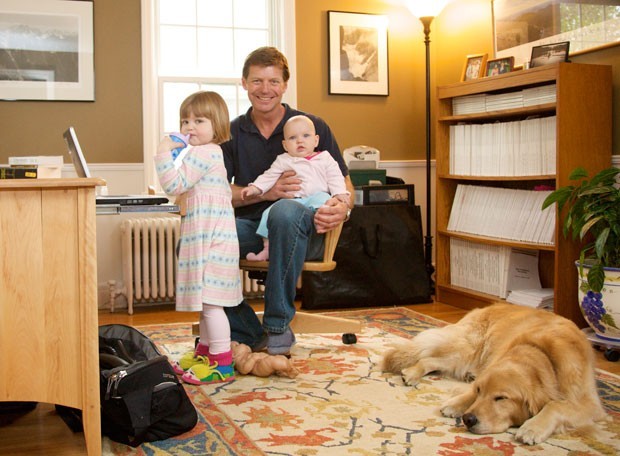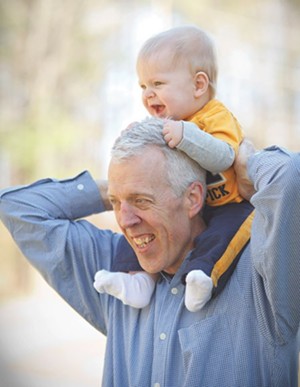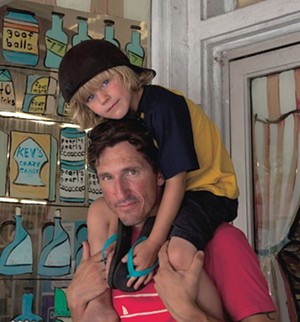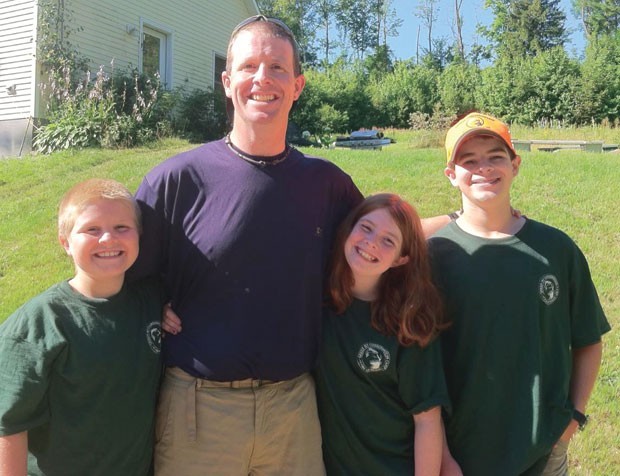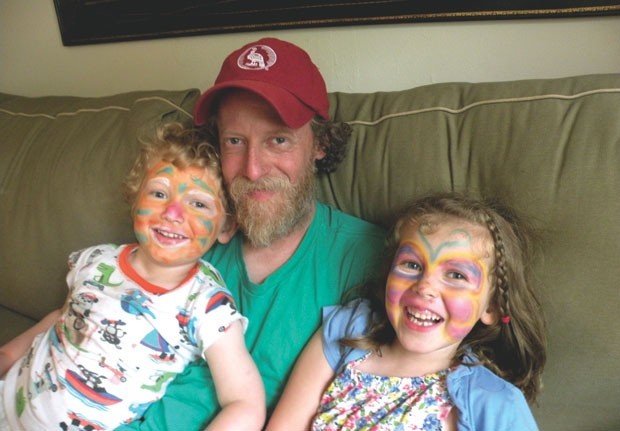Published June 1, 2012 at 4:00 a.m.
The traditional image of the American father has been under revision for decades — at least long enough to make TV's first father, Ward Cleaver, look like a nostalgic cartoon and his latter-day "Mad Men" counterpart, Don Draper, a pointed example of the bad old days of meat, potatoes and patriarchy.
Women entering the U.S. workforce after the Second World War changed American culture. Then, when the U.S. economy took a nosedive about five years ago, the game changed again — this time booting men out of the workforce at twice the rate of women, according to the Bureau of Labor Statistics.
One combined effect of women holding jobs and men being forced out of them is that men are increasingly responsible for managing ... households. An analysis of 2010 U.S. census data finds that 20 percent of fathers with children under age 5 are the primary child caretakers in their families.
Here's what seven of them have to say about it.
Mark Gabel, South Burlington
Daughters Mairi, 6, and Libby, 3
When his first daughter was about a year old, Mark Gabel did the math and realized that "my salary was paying the nanny." His physician wife was the family's major breadwinner; Gabel had been in retail sales and management for roughly 20 years — most recently at downtown Burlington's Climb High outdoor gear store. The combination had worked well, he says, "when it was just about us." But when his daughter entered her second year, he had a revelation. "I looked up one day and said, 'This is crazy,'" he recalls. "'My kid's a year old. I hardly know her.' I was watching myself become my father with no benefit financially."
On a walk with mountaineer Simon Yates, of Touching the Void fame, Gabel got more inspiration to change course. He remembers being moved by Yates' insight that his only regrets were about what he hadn't done, not what he had.
Gabel gave notice at Climb High and settled in for an extended stay at base camp.
While the initial plan was for him to stay home until his daughter was in kindergarten, a second child changed the equation. Gabel made good use of his stay-at-home dad time to earn undergraduate and graduate degrees from Champlain College, the latter an MS in mediation and applied conflict studies that he hopes will help him reenter the workforce.
He admits there are tough parts, such as the "humbling" experience of being a husband who doesn't bring home the bacon, and being the odd man out — literally — at baby yoga. There's also doing laundry seven days a week and a workday that, by his estimate, starts at 6 in the morning and ends at 10 p.m.
But he still feels like he's getting the better end of the parenting deal because of the bond he has established with his kids. "Not a day goes by when I don't feel like the luckiest guy alive," he says, "even when someone is throwing tantrums."
Brendan Smith, St. Albans
Daughter, Chloe, 9; son, Drew, 7
When Brendan Smith and his wife were anticipating the arrival of their daughter, they held a series of rational sit-down talks about switching roles. There was more at stake than the traditional expectations related to gender: Smith is visually impaired. He's not totally blind, but he can't operate a motor vehicle.
At first, Smith was pretty nervous — and understandably so. If his child were to choke on something, would he be able to see what it was? With two babies in his care, what if they took off in opposite directions?
Smith made it through those anxious infant years by concentrating on doing the best he could. He engaged his kids in activities that didn't require driving anywhere. "I took it upon myself to take a negative and work around it," he says, "to get them out, go for walks with them, take them where I could on foot. Push them on the swings. Run with them. Make up for the lack of transportation. I've even taken them on the bus a few times, and they seem to get a kick out of that."
It hasn't been easy. Feeling the financial pinch, Smith went back to work parttime at Hannaford supermarket, but he's still there to greet his kids at the bus on school days. He and his wife divorced about a year and a half ago, but there hasn't been much conflict over parental rights.
"My kids are comfortable here, they have a lot of friends, and they get into a lot of sports and do a lot of community stuff," he says.
He also gives himself some much-deserved credit: "It's hard enough being a single parent in this day and age, anyway, but an even greater challenge to be able to handle children on your own when you're limited yourself," he says. "I've been able to take on the challenges, and I think I've done reasonably well."
Michael Wheeler, Milton
Two grown daughters, Joanna and Sarah, who have kids of their own; daughter, Emmy, 4; son, Elliot, 8 months
Michael Wheeler and his wife couldn't decide who should be the primary daytime caregiver for their first child. But at just about the time their due date rolled around, fate made the decision for them. The UVM laboratory where Wheeler had been working shut down. Coincidentally, he had already been mulling over whether being a stay-at-home dad would be a "cool thing to do."
As his daughter developed food allergies and then a son came into the picture, his decision proved wise. "I thought that I might go back to work after a while," he says, "but I'm thinking that less and less."
It's something of a redo for Wheeler, who became a dad for the first time in the '70s. When his older daughters — now the mothers of his grandchildren — were born, he was working as a chemistry teacher at a small college. His busy work life didn't allow him to be as present as he would have liked. "It's in the minutiae of the day that kids really become who they are, and I certainly didn't experience that like I am now."
When it comes to parenting wisdom, "I consider myself a rank rookie."
Being an older stay-at-home dad, he has to be vigilant in avoiding the occupational hazards of parenting. "I was sort of a young dad when my older kids were born," he says. "I don't have a recollection of feeling tired or holding a 20-pound child all the time, but now I do. I've had to learn to be careful with the way I hold them and pick them up."
Still, he adds, being close at hand while his kids are growing has been a revitalizing experience. "It's just an amazing thing to watch a human being develop into a person, and it's doggone miraculous to see our oldest kid start to figure things out and ask insightful questions and make funny mistakes and all that kind of stuff," he says. "So even though my body feels older, my spirit is younger than it was before they were born."
Shem Roose, Richmond
Daughter, Sylvie, 8; son, Ivan, 5
At the pinnacle of his career as a snowboarding photographer, Shem Roose followed the world's top riders wherever they roamed from January to May. By the time his daughter, Sylvie, was born in 2003, however, he was already starting to burn out on his jet-setting job. With his wife working full-time at MyWebGrocer, he decided to take a run at being a stay-at-home dad.
Despite possessing all the organizational skills required to shoot in hard-to-get-to places, Roose was surprised by how difficult it was "just keeping up with all of the stuff that needs to be done around the house," he says, such as cooking and doing the laundry. "It really took me a while to preplan," he adds. "If we were going to go swimming ... that was a challenge for me, to make sure I had everything." Living two miles up a dirt road raised the stakes. "Because of where we live, once you leave the house, you really don't want to forget anything," he says.
Roose cultivated a freelance photography business when his kids were sleeping. Still, the memory of how high he'd climbed in his career haunted him for a while. "I would have periods where I would feel like, 'God, I just don't feel like a man,'" he remembers. "I was doing dishes and vacuuming and folding laundry and taking care of the kids. I was kind of wondering, When does this end? or What's next? ... I felt lost for a while."
Add to that the financial strain of living on a single income, unequal time with the kids and the isolation of rural living.
Roose eventually found his groove, arranging play dates with other dads and organizing trips to the ECHO Lake Aquarium and Science Center and libraries. Roose and his wife also enrolled in the Parenting on Track workshop, which he says has been helpful in his mediating squabbles between his kids.
For the dad contemplating taking on the role of primary caregiver, Roose recommends, "Be ready for the ride of your life. Being patient is the key. If you're the type of guy that doesn't have a lot of patience and a lot of energy, then it's just going to wear you down."
Matt Howes, Fayston
Sons, David, 14, and Ethan, 10; daughter, Morgan, 12
Matt Howes was working parttime as a school bus driver when his first son was born. The single car seat installed behind him in the bus soon became three, as his second son and daughter joined the family. Eventually, he was dropping them all off at school.
The gig came with benefits, though not the kind associated with traditional employment. "One of the joys is I get to hug my kids every day when they get home from school," he says. "I know my kids. My kids know me ... That's what's important to me."
Howes now works parttime as a propane technician but continues to be the primary caregiver in the family. It was a practical choice: As his wife advanced in her career as a social worker, she had the potential to make more money than he did.
Naturally, there have been some bumps in the road, especially when Howe's wife began pursuing a graduate degree. "I remember stepping up to the sink at 10 o'clock at night one night and just looking at piles of dishes, and my wife was at one of her night classes," he recalls. "I just remember going, 'Holy crap.' I didn't realize kids could be this much work. I was just astounded. At a really weak moment I was like, 'Nobody ever told me this.' I almost had a pity party for a moment there."
There are other difficult aspects to being a stay-at-home dad in a fairly rural locale. Playgroups are "spotty," he says, complicated by the difficulty of arranging play dates with stay-at-home moms. "A guy going to a different woman's house or a woman coming to my house — it doesn't happen," he says. "It's too weird ... and rumors fly."
Howes acknowledges occasionally wondering when his own career will advance, but he says he's not in a hurry. "You only have a certain amount of time to influence the kids and raise them up the best way you can," he says. "I'm going to enjoy being with my kids as long as they enjoy my being with them."
Tom Schicker, Burlington
Twin daughters, Sylvie and Uma, 6
Tom Schicker followed his college-professor wife to Vermont in 2008, when their twin daughters were 2. The toddler years presented challenges well beyond what every parent is prepared to expect.
Sylvie has an extremely rare degenerative neurological condition, Krabbe disease, symptoms of which include severe sensory and motor impairment, difficulty swallowing, and frequent seizures. Only between 10 and 20 percent of kids with Krabbe live past their second birthday.
"Being forced daily to confront the uncertainty that we all face, but are able to ignore, is front and center all the time," Schicker says.
Schicker became a stay-at-home dad to care for Sylvie. It's enabled him to design days that allow his two daughters to do as much together as possible — a goal that has become harder to achieve in recent months as Sylvie has experienced mounting medical issues.
School fits the bill. Sylvie and her sister, Uma, are kindergarteners at the Sustainability Academy at Lawrence Barnes in Burlington's Old North End. "We have a nice chance to walk to and from school," Schicker says. He praises the school faculty and staff who are "super at trying their best to keep Sylvie involved in the class."
One of Sylvie's part-time personal care assistants is also her in-school instructional assistant, and Uma is in the same class and often at her sister's side. "She's wicked smart, so she's got to be aware of what's going on," Schicker says of Uma. "At the moment she doesn't treat her sister as ill, which I just love. I try to emulate that as much as possible, even when it seems a little bit psychotic. That's kind of how I want to view Sylvie, too. She's just who she is."
One of their favorite afternoon activities is baking. With Sylvie in a stander — a device designed to help her strengthen her joints — she can watch her father and sister making pretzels, while she touches the ingredients. "Those are some of my happiest moments," Schicker says, adding both girls enjoy eating what they make, too. "That's when I feel like a success. Sylvie just likes being around people who love her. That's what we work for now."
Ted Kohn, Burlington
Daughter, 5; son, 3
Ted Kohn was juggling parenthood and his own career when he decided to focus exclusively on the former. The logic was that his wife's job — a salaried position — was a safer bet professionally than his one-man advertising agency. While the decision was at first unsettling, he now looks back on it as "the best thing that ever happened to me."
Kohn is quick to add that sacrificing a career to full-time parenting doesn't make him — or any other stay-at-home dad — special, beyond bucking a social norm. Just ask any woman who has done the same thing. Most mornings, the playgrounds are full of them.
Speaking of mommies, Kohn says that being seen with his kids in public — without their mother present — has occasionally aroused suspicion. A security guard once followed him into a public restroom where he had gone to change a diaper.
Some men in more traditional parenting roles also fail to appreciate the rigors of being the primary caregiver, he adds. This has come up around Kohn's side business — a family-focused woodworking company called Quick Brown Fox. "They'll say, 'It must be nice to have so much time.' They think I'm on vacation," he says. Again, he knows this response is nothing new. "Moms have been dealing with that stereotype for ages," he says.
For Kohn, the difficulties — reduced household income among them — are well worth the effort. "The domestic setting, the constant child-rearing setting, is sort of centering in a way," he says. "It's exposure to a simpler life, simpler things, simpler joys. You're busy constantly, but there's something meditative about it. The things that maybe other people think are important in life — I don't really care about those things anymore ... There are clichés aplenty for seeing life through a child's eyes, but there are reasons for that. It's a pretty significant realization when you have it yourself."
This article was originally published in Seven Days' monthly parenting magazine, Kids VT.
More By This Author
About the Artist

Matthew Thorsen
Bio:
Matthew Thorsen was a photographer for Seven Days 1995-2018. Read all about his life and work here.
Matthew Thorsen was a photographer for Seven Days 1995-2018. Read all about his life and work here.
Speaking of...
-

Vermont's Childcare System Isn't Working for Providers or Parents. They Hope Help Is on the Way.
Jan 11, 2023 -

A New Mom's Guide to Getting Ready, Staying Organized and Finding Social Time
May 17, 2022 -

Pop Culture: Vermont Dads Lead the Way
May 17, 2022 -

Local Down Syndrome Group Holds Buddy Walk
Sep 17, 2021 -

Mr. Fix-It: Marty Spaulding Works Behind the Scenes to Help Students Learn on Campus
Aug 24, 2021 - More »
Comments
Comments are closed.
From 2014-2020, Seven Days allowed readers to comment on all stories posted on our website. While we've appreciated the suggestions and insights, right now Seven Days is prioritizing our core mission — producing high-quality, responsible local journalism — over moderating online debates between readers.
To criticize, correct or praise our reporting, please send us a letter to the editor or send us a tip. We’ll check it out and report the results.
Online comments may return when we have better tech tools for managing them. Thanks for reading.




































